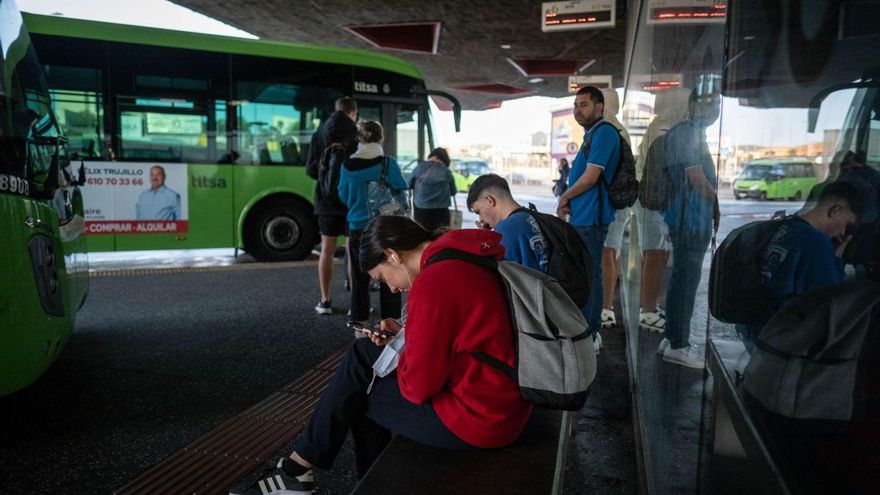
Tenerife and Gran Canaria will jointly buy the fuel for their public buses in order to get the best prices and save costs. The measure will be implemented this year thanks to the historic collaboration commitment reached by both councils. The Vice President and Minister of Mobility and Highways of the Tenerife Island Corporation, Enrique Arriaga, and his counterpart from the Gran Canaria institution, Miguel Ángel Pérez, announced this yesterday after a meeting in which agreements were reached for fuels and other lines of collaboration , such as reducing the pollution of its fleets and the introduction of hydrogen, a clean fuel in full development.
With an average annual consumption of the buses on each island of more than 40 million liters of diesel –more than 60 million euros with the current price of 1.5 euros per liter–, the two corporations come together to face the rise in prices caused by the Russian invasion of Ukraine, which began on February 24 of last year. Both councils report that they are planning an agenda of contacts with the different agents of the energy market “to establish a framework that strengthens the conditions of Tenerife and Gran Canaria with a view to the coming years.”
Enrique Arriaga assured after the meeting that “while others have always sought distance, conflict and separation”, in clear reference to the lawsuit between the capital’s islands, “we are working together because strength is born from union, and that strength is which improves the lives of all canaries ». Miguel Ángel Pérez del Pino added for his part that “it is time to create an opportunity together from a possible individual weakness: Tenerife and Gran Canaria united to seek the best conditions makes us stronger, as islands, as an archipelago and as a society” .
60
millions of euros
The councils of Tenerife and Gran Canaria spend each year more than 60 million euros on diesel for buses, using the current price of 1.5 euros per liter as a reference.
1,320
buses on both islands
The fleets of public buses in Tenerife and Gran Canaria exceed 1,300 vehicles. In Tenerife they are managed by a single company, Titsa, while in Gran Canaria there are six.
Stronger transportation
Negotiating jointly between both councils and being able to go to the markets together make Tenerife and Gran Canaria “more resilient to fluctuations in the energy market and will propose a roadmap towards the decarbonization of their respective public transport sectors,” Arriaga explained. The vice president from Tenerife agreed with the Gran Canaria that the future of both islands will be better “with union and collaboration.”
Between February, the month in which the war in Ukraine broke out, and June, fuel prices did not stop rising in most of the world. In the province of Santa Cruz de Tenerife, Diesel went from 1.2 euros per liter to 1.7. And in the country as a whole, it was 1.5 euros per liter and increased to 2.1 in June. As of the beginning of summer, prices fell but at the end of 2022 they remained above the end of 2021.
The councils point out in a joint press release that the current energy crisis derived from the war in Ukraine “has caused a situation of economic inflation in fossil fuels that has brought to light the special dependence of Canary Islands in the energy sector. “Our characteristic geographical situation, far from the mainland, and our condition of insularity cannot be an obstacle when it comes to negotiating what interests our citizens the most, which is nothing more than getting more benefit from our public money,” Enrique clarified. Arriaga. “We are aware that negotiating together helps us get more out of our respective economies; that is, to make better use of the money of our citizens», pointed out Pérez del Pino for his part.
A fleet that is renewed
Tenerife has a fleet of more than 600 public buses managed by a single company, Transportes Interurbanos de Tenerife (Titsa), which employs 1,800 workers. It also has plans to acquire another 250 vehicles in the next three years. Titsa’s green vehicles cover the entire island. Meanwhile, in Gran Canaria there are some 720 public buses, also managed by the Island Corporation, divided into six operators: Global, Municipal busesLa Pardilla, Guzmán Sosa, Gumidafe-Alsa and Telbus.
This collaboration comes just four days after the free public buses in the Canary Islands came into force, as well as the tram in the metropolitan area of Tenerife. On the island of Tenerife, passengers who make more than 15 trips per month with their vouchers will not pay. Titsa and the Metrotenerife trams, public transport companies of the Cabildo de Tenerife, registered 12,768 recharges during the first two days of free transport passes. In total, this means that the number of titles sold was nine times higher than that recorded in the same days of 2022. The discounts have increased the use of public transport throughout the island of Tenerife.















